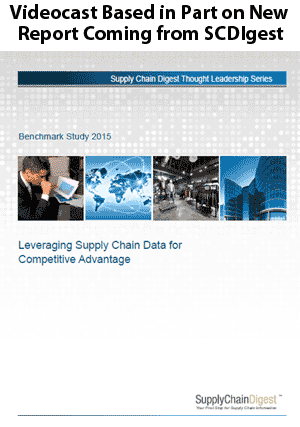 |
September 10, 2015 - Supply Chain Flagship Newsletter |
 |
| FEATURED SPONSOR: LLAMASOFT |
||
 |
||
Download Case Study: |
 |
|
||||||||||||||||||||||||||||||||||||||||||||||||||||||||||||||||||||||||||||||
"I'm going to have Fred Smith, the founder of FedEx, come work for the government for three months," to show us how to do it, Christie said. But again, at a high level the article mostly reflected what I said. But in talking about the issue with some friends this past weekend, I soon realized the average person really has no idea how the FedEx system works, and generally doesn't see any reason why it couldn't be applied to immigrants or people generally. So taking it a little easy on this short work week, I am going to provide some insight as well as some contextual perspective. I am going to start with the question of whether even if you could track people like boxes, should you? Obviously, this presents some ethical and "big brother" type issues that many would find highly objectionable. In the early days of bar coding, in the late 1980s and early 90s, on more than one occasion I came out of conferences/trade shows focusing on auto ID (e.g., the old Scan Tech show) to find flyers on my car windshield. The flyers would contain an image of a bar code tattooed on a man's forehead or arm, accompanied by a dire warning about bar codes being the "mark of the devil." Perhaps a little less sensational, a former Harvard professor named Katherine Albrecht gained some measure of fame with a book, roughly emerging with the Walmart RFID mandate in 2003-04, titled "Spy Chips: How Major Corporations and Government Plan to Track Your Every Purchase and Watch Your Every Move." Part of the idea was that as retail goods were tagged with RFID, what you purchased could somehow be tracked at the POS and then even as consumers took their goods home. It led to several states passing legislation requiring retailers to kill or remove RFID tags at the time of purchase. Of course today, most every purchase a consumer makes is already tracked by credit card companies, adding little value to redundantly doing it as well with RFID, but certainly there were some modest concerns about RFID and privacy early on, though I will note the Spy Chips web site seems stuck in 2007, even as finally now many years after the Walmart RFID program failure item-level RFID in soft goods retail is almost to the point of critical mass. Interestingly, a program a few years ago based on having RFID tagged ID cards attached to the back packs of students in a San Antonio area high school gained national attention when one student refused to participate. Though school officials said the focus was simply on attendance and truancy, the protest by the female student that this was a general purpose tracking system that invaded her privacy touched a nerve, and the program was cancelled not long after as other parents got on the bandwagon. Another tacking system of a sort can be found in some amusement parks that provide RFID-tagged tickets that enable parents to find out where their children should they become separated. I believe you have to "opt in."
I believe some jails are doing similar things with RFID chips embedded in prison garb. I haven't heard anyone complaining of privacy issues relative to the prisoners. So, let's assume we agree with the idea of tracking immigrants like FedEx packages is a good one, for various reasons. Could it be done? The answer is No. Here is why. First, the FedEx and most other tracking technology involved closed loop systems that operate in a highly controlled environment. FedEx employees scan a box when it is received or picked up. That say places that package in a specific FedEx truck. It is then scanned again when it arrives at a local FedEx station, then again when it is put on a truck headed to the airport, etc., as anyone who has ever tracked a package on-line knows. But the system doesn't work outside that controlled environment. If a FedEx worker took a package outside the local station, FedEx has no idea where that box is. The entire system is based on FedEx employees scanning each box at defined entry and exit points. And importantly, the box appears to not mind being tracked. So what type of process or system could possibly be developed to replicate that approach with a human being? If the idea is they will get a tap on the shoulder when it's their time to go, and they don't want to go, then obviously they would destroy the bar code or hide the fact that they have one. And where on earth would be the places that do the scanning, as an immigrant travels wherever they please? Well, maybe we could embed a chip instead. We do it with dogs and cats, don't we? Well, yes we do, but the cats and dogs don't object. And that RFID system does not track an animal, it only identifies the animal should it become lost. There have been some ideas around using the RFID tags on cars in many metro areas to track cars on major highways. This would take a change in the tag technology on cars now as well, cost a giant amount of money to put readers are the roads, only work on the roads, and only tell you where a car was, not who is in it. Other than all those issues - piece a cake. We'll be tracking immigrants and maybe even the rest of us someday soon - not. Your best bet, Mr. Christie, is probably credit card tracking, and that won't get you very far. They could just pay with cash anyway. The automated license plate readers on cop cars could actually work as well - if a visa holder has overstayed and their license plate is read, they get pulled over - and "tapped on the shoulder." Any reaction to Gilmore's summary of the immigrant tracking issue? What would you add? Will we have iris scanning some day? Let us know your thoughts at the Feedback button (email) or section (web form) below. |
|||||||||||||||||||||||||||||||||||||||||||||||||||||||||||||||||||||||||||||||
|
|||||||||||||||||||||||||||||||||||||||||||||||||||||||||||||||||||||||||||||||
|
|||||||||||||||||||||||||||||||||||||||||||||||||||||||||||||||||||||||||||||||
|
|
|
YOUR FEEDBACK
Catching up on some miscellaneous Feedback this week - we're behind.
Feedback on SCDigest Omnichannel Report:
I just read your white paper "Conquering the Omnichannel Challenge - Today and for the Long Term." Eric Lambert Editor's Note: |
||
| Feedback on SCDigest Q2 Rail Review: | ||
Do you have BNSF numbers? Editor's Note: |
||
| Recent Feedback on We're Not Sure What but They are Pretty Good: | ||
In my opinion, supply chain managers are crucial for the world economy. They represent a single discipline, responsible for supporting the global network of delivery of products and services throughout the supply chain, from raw materials to delivery of products and services to end customers. Specifically, administrators/managers supply chain are committed to the design, planning, execution, control, and monitoring of activities in the supply chain with the objective of generating added value, building a competitive infrastructure . In any business, the supply chain depends on the knowledge we have on raw materials, planning, manufacturing, distribution, etc. Likewise, the development of new products requires knowledge of the needs of consumers, new scientific discoveries, new technologies, marketing, etc. The challenge of applying knowledge in a company to create competitive advantage becomes even more challenging because the market is increasingly competitive, which demand greater product innovation. Because of this, knowledge must be developed and assimilated increasingly faster.
Mela Moskera |
||
Demand chain management (DCM) is the management of relationships between suppliers and customers to deliver the best value to the customer at the least cost to the demand chain as a whole. Demand chain management is similar to supply chain management but with special regard to the customers. |
SUPPLY CHAIN TRIVIA ANSWER
Q: What are the top five US importing companies based in number of inbound TEU in 2014?
A: (1) Walmart; (2) Target; (3) Home Depot; (4) Lowes; (5) Dole Food.
| © SupplyChainDigest™ 2003-2015. All Rights Reserved. SupplyChainDigest PO Box 714 Springboro, Ohio 45066 |
POWERED BY: XDIMENSION
|









